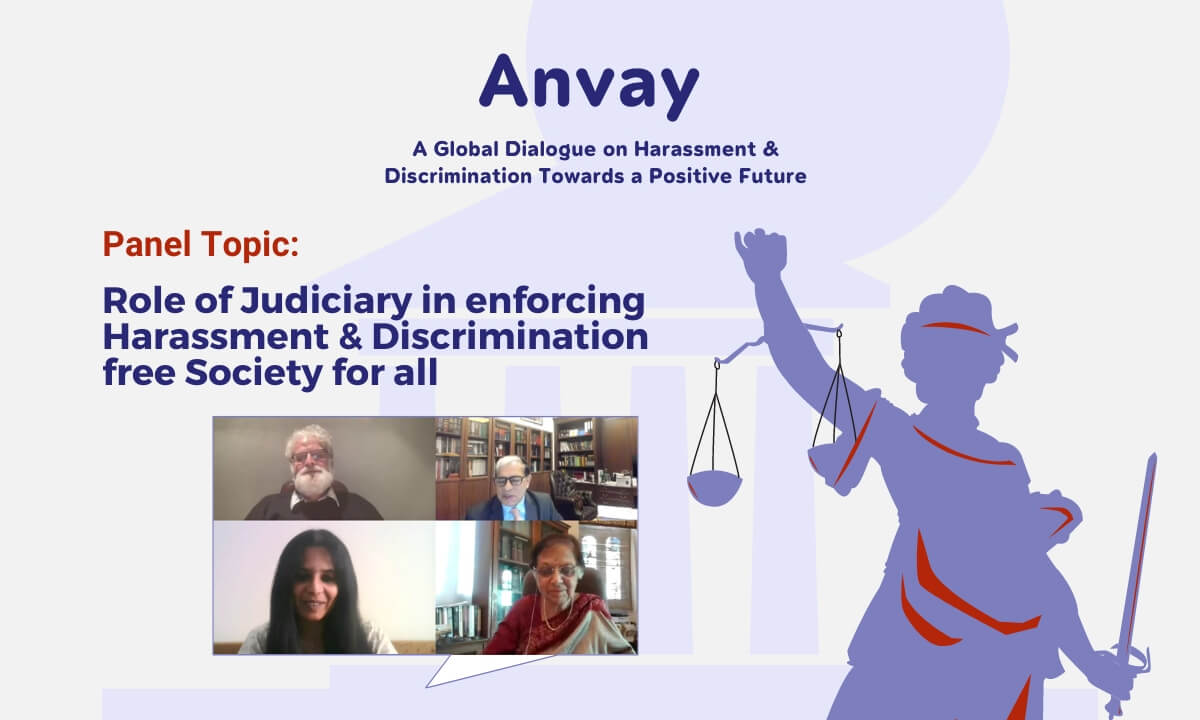At Anvay, 2023, one of the key panel discussions “Role of Judiciary in enforcing Harassment & Discrimination free Society for all,” featured insightful contributions from:
- Hon’ble Justice Sujata Manohar (Retd.), Authored the Vishaka judgment in 1997, paving the way for the Vishaka Guidelines and setting the foundation for the POSH Act of 2013.
- Hon’ble Justice A. K. Sikri (Retd.), Authored the groundbreaking NALSA judgment in 2014, a cornerstone for the Transgender Persons (Protection of Rights) Act, 2019.
- Hon. Justice Rowan M. Downing KC, International Jurist, Australian attorney Former Judge, Supreme Court & Court of Appeal in Vanuatu Former Solicitor General, Vanuatu Former Judge, United Nations Dispute Tribunal Part-time President, International Civil Aviation Appeals Board, Montreal.
- Shivangi Prasad, Founder – The Legan Swan, POSH at Work and Respekt.
The judiciary plays a crucial role in establishing and maintaining a society free from harassment and discrimination, acting as a guardian of human rights and social justice. This responsibility is underscored by landmark judgments that have shaped legal frameworks and societal attitudes towards marginalized communities. The key insights from this panel are summarized below:
Vishaka Judgment and the POSH Act
- Justice Sujata Manohar’s Contribution: Authored the landmark Vishaka judgment in 1997, establishing the Vishaka Guidelines which laid the groundwork for the Sexual Harassment of Women at Workplace (Prevention, Prohibition and Redressal) Act, 2013, also commonly referred to as the Prevention of Sexual Harassment or POSH Act.
- Case Highlight: The judgment was influenced by a case involving a social worker in Rajasthan who faced sexual violence for her efforts against child marriages.
- Community Involvement: The involvement of committed women from the Vishaka group and leading lawyers was crucial in formulating effective guidelines for addressing sexual harassment at workplace.
NALSA Judgment and Transgender Persons Rights
- Justice A.K. Sikri’s Insights: Authored the NALSA judgment in 2014, pivotal for the Transgender Persons (Protection of Rights) Act, 2019.
- Recognition of Identity: Emphasized the importance of dignity and identity for transgender individuals, advocating for their rights to education, employment, and societal inclusion.
- Impact on Lives: Post-judgment, members of the transgender community expressed gratitude, stating that the ruling provided them with a sense of identity.
Disability Rights and Inclusivity
- Case of Jeeja Ghosh: Highlighted the discrimination faced by disabled individuals through the experience of activist Jeeja Ghosh, who was denied boarding on a flight due to her disability.
- Human Rights Perspective: Advocated for viewing disability rights as human rights, emphasizing equality and dignity as fundamental principles.
Feminist Approach to Social Justice
- Empathy and Sensitivity: Stressed that judges must embody empathy and sensitivity, qualities often associated with feminist perspectives, to effectively address issues faced by marginalized groups including LGBTQ+, disabled persons, and members of scheduled castes.
- Creating Inclusive Societies: The judiciary must foster conditions that enable marginalized communities to integrate fully into society without facing discrimination or harassment.
UN’s Approach to Human Rights
- Justice Rowan M. Downing KC’s Perspective: As part-time President of the UN Dispute Tribunal, he highlighted the UN’s commitment to human rights as outlined in the Universal Declaration of Human Rights.
- Workplace Rights: Emphasized that every individual has the right to work free from harassment and discrimination.
- Challenges within the UN: Identified issues such as sexual harassment initiated by superiors and discrimination based on nationality within UN operations.
Accessibility to Justice
- Judicial Activism: Advocated for an activist approach in judicial proceedings to ensure justice is served effectively.
- Empowerment of Individuals: Highlighted the need for courts to facilitate access to justice for uneducated individuals, ensuring they can enforce their rights without barriers such as application fees or complex legal processes.
By addressing these critical issues through judicial activism and a commitment to human rights, the judiciary plays a vital role in fostering a society free from harassment and discrimination.
As highlighted by various justices, the emphasis on empathy and sensitivity in judicial proceedings is essential for understanding the complexities of human rights issues. The commitment to creating accessible legal frameworks ensures that even the most vulnerable populations can seek justice without barriers. This proactive approach is a testament to the judiciary’s evolving role as a champion of human rights, reflecting a broader societal shift towards inclusivity.
By fostering an environment where every individual can thrive free from harassment and discrimination, we pave the way for a more just and equitable society. The judiciary’s commitment to these principles not only enhances the lives of marginalized communities but also enriches our collective humanity, reminding us that justice is a shared responsibility that benefits everyone.
Authored by – Gomathi Sridevi Radhakrishnan, Content Writer Intern, The Legal Swan.


